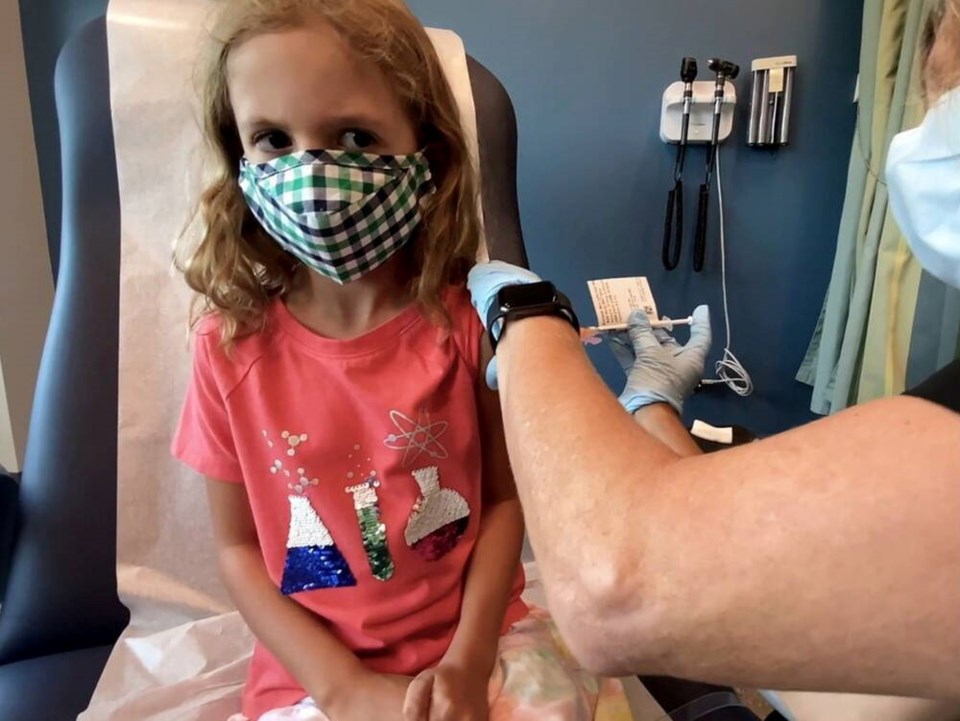The B.C. government has issued an order requiring children five and older to wear masks in indoor public spaces, expanding a mandate for those aged 12 and up as the province prepares to vaccinate younger kids pending Health Canada approval.
The order comes less than two weeks after rules around masks in schools were expanded to include students in kindergarten through Grade 3. “For youth, whether taking the school bus or the city bus, the rules are the same,” Dr. Bonnie Henry, provincial health officer, said Tuesday.
Henry said about 340,000 children 11 and under would be eligible to get vaccinated when a vaccine is approved. Pfizer has requested Health Canada approve its vaccine for children ages five to 11.
“We may have that important vaccine available to us as early November,” Henry said. “So we continue to talk with school communities, families and parents to ensure the process will be as seamless as possible for everyone, and make sure that our logistics are all in place so that we can provide the vaccine as soon as it’s available.”
Henry said parents or guardians can register their children through the provincial Get Vaccinated portal at getvaccinated.gov.bc.ca.
Priority will be given to those in the northern region, she said, where COVID-19 transmission rates are highest due to lower vaccine uptake.
The quick spread of COVID-19 in the north is causing serious illness, including among younger residents, as hospitals are “pushed to the limit,” she said. “There are some communities, particularly in the northwest, Haida Gwaii, for example, Prince Rupert, where vaccination rates are really high and we’re not seeing that type of transmission. But there are other communities where things are not going as well.”
Henry cautioned that the COVID‑19 of last year has drastically changed and youth and young adults are not immune. “It’s not the same as it was last summer where young healthy people had relatively mild illness; we are seeing severe illness in young people without underlying illnesses and that is what is, in some cases, overwhelming our heath care system.”
“For young people who thought they could just weather this: you need to be vaccinated,” Henry said.
The province will take “a number of different approaches” in how it distributes the COVID vaccine for younger children, likely using pharmacists and public health units rather than physicians’ offices. For some rural and remote communities, it may be delivered as part of booster-dose clinics, she said.
The vaccine for youth is expected to be fridge stable, but the latest indications are that it will need to be transported frozen and will have a limited time during which it can be used, Henry said. “We don’t know those details yet.”
The province will notify parents when it’s time to book an appointment for their children. That will come after the vaccine is approved by Health Canada and distribution dates for B.C. are confirmed.
Henry said she does not expect that children younger than 12 will be required to register for a B.C. Vaccine Card.
Meanwhile, the province has started to receive doses of the flu vaccine and there will be a large immunization push, Henry said.
The province is starting immunization clinics in the highest-risk settings, as it does every year. Flu shots will be “broadly available in communities around the province, primarily through physicians’ offices and pharmacies like we have in the past,” starting next week, she said.
“I will caution as well we know that influenza spreads really easily among younger children, especially infants and young babies,” Henry said. “But it can also cause severe illness in school-aged children and can spread really rapidly. So, these are things that we need to start thinking about right now as we move into the fall.”
ceharnett@timescolonist.com



